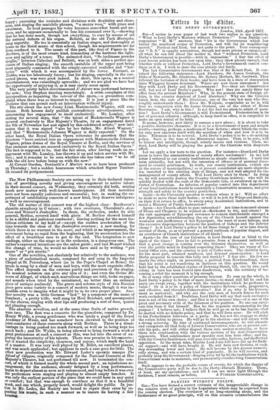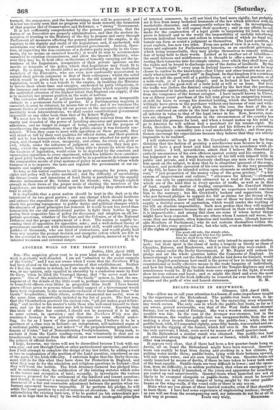PARTIES WITHOUT POLICY.
Sin—You have formed a correct estimate of the inappreciable change in the relative state of parties in the Legislature which may be expected from the coming election. The overthrow of no long-standing abuse, and the furtherance of no great principle, will on this occasion counterbalance the turmoil, the annoyance, and the heartburnings, that will be generated; and it is but too clearly seen that no progress will be made towards the formation of that popular idol of Conservative and Reformer, a "strong" Government. It is not sufficiently comprehended by the present generation, that the duties of an Executive are properly administrative, and that the modern in- novation of trusting to the Ministry of the day to prepare and carry through
Parliament all measures affecting the general interests of the empire, is de- rogatory. to the dignity and credit of the Legislature, and, if unchecked, will
undermine our whole system of constitutional government. Instead, there- fore, of regretting the non-existence of a decisive party majority in the Com- mons, (by no means an unmixed benefit,) it would be wise to accommodate ourselves to existing circumstances, and allow the Queen's Ministry, who- ever they may be, to hold office on the terms of honestly carrying out the in- tentions of the Legislature, irrespective of their privateopinions on the merits or demerits of the policy which that Legislature may think fit to adopt. By so doing, we should inflict no peculiarhardship on the individual members of the Executive, who are even now confessedly necessitated to submit their private judgment to that of their colleagues; whilst the relief which would be given them by a return to the old system of independent legislation, would be a vast benefit to the empire, in enabling the Ministry to devote their whole time and energies, unchecked by party obligations, to the immense and ever-increasing administrative duties which urgently claim the undivided attention of the highest talent that England can supply, if she is to maintain her present position in the scale of nations. The extensive diffusion of political knowledge interposes an insuperable obstacle to a permanent fusion of parties. If a Parliamentary majority is
essential, it must be obtained, by means fair or foul; and if we continue the present tactics of concentrating all our powers on the successive ejectment of inevitably weak Administrations, we shall render constitutional government impossible on any other basis than that of Sir Robert Walpole.
Wo must bow to the law of necessity. A Ministry relieved from the ne- cessity and denuded of the power of lavishing sinecures and pensions on its adherents, and no longer in danger of being employed for the purpose or overthrowing the constitution, is not the public enemy it was formerly con- sidered. When they cease to most with opposition on these grounds, they will stand or fall by their real qualities for official duties, and their position
will not be less honourable when they are no longer attacked for party pur- poses, and charged with error, incapacity, and crime, for every act, good or
evil, which, under the influence of judgment or necessity, they may per- form ; whilst the representative body, being able to devote its whole time to' the business of legislation, would cease to be degraded by the constant and unmeaning opposition to every enactment, which has hitherto been consider- ed good party tactics, and the nation would be in a position to determine upon the comparative merits of rival systems of policy in an assembly whose whole business it is to improve the laws and regulate the government of our ex- tensive and mighty empire. So long as the nation continues to aid in party struggles for power, prin- • ciples and policy will be alike sacrificed ; and the difficulty of ascertaining the future course and intentions of Lord Derby is paralleled by the equally obscure intimations of Mr. Cobden and his friends ; who, though explicit enough in their views of the proper mode of electing the members of the Legislature, are inscrutably silent upon the line of policy they afterwards in- tend to adopt. It is deplorable that a great nation should be kept in the dark as to the intentions of its two great parties ; and any change which should facilitate and enforce the exposition of their respective final objects, would go far to check the growing repugnance to public duties and political changes which the abeyance of great principles has fostered. It would be not less novel than honourable for our old constitutional parties to fight their battles by im- portant their respective line of policy for discussion and adoption on all m- portant questions, whether of the Cape and the Colonies, or of the National Defences and the proper employment of a fleet. The nation is rapidly be- coming tired of opposition for opposition sake; and a well-defined theory of government carried out with determination and skill, would enlist the sym- pathies of thousands, who are tired of abstractions, and would gladly hail from any quarter the prompt decision and energetic action which are felt to be the essential to the maintenance of our high position, menaced as it is by internal weakness and external danger. II. D.



























 Previous page
Previous page